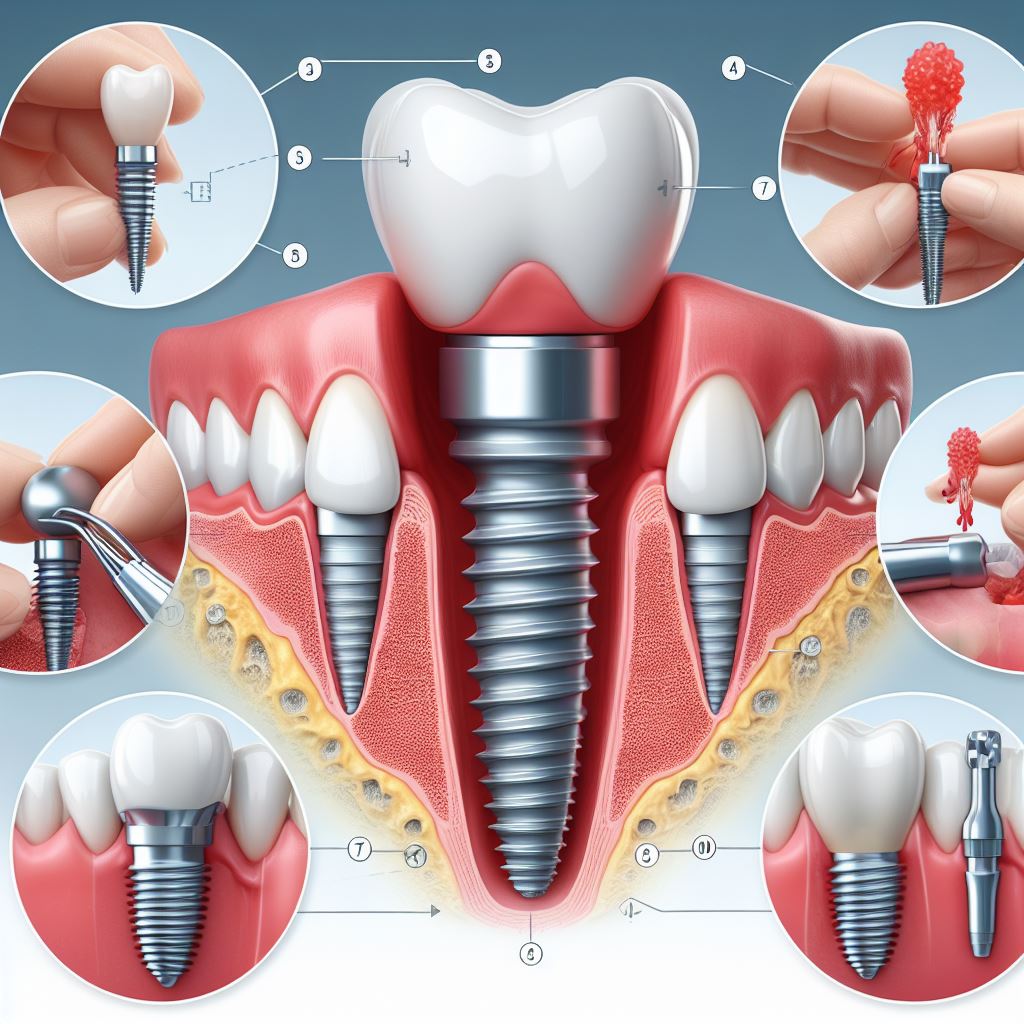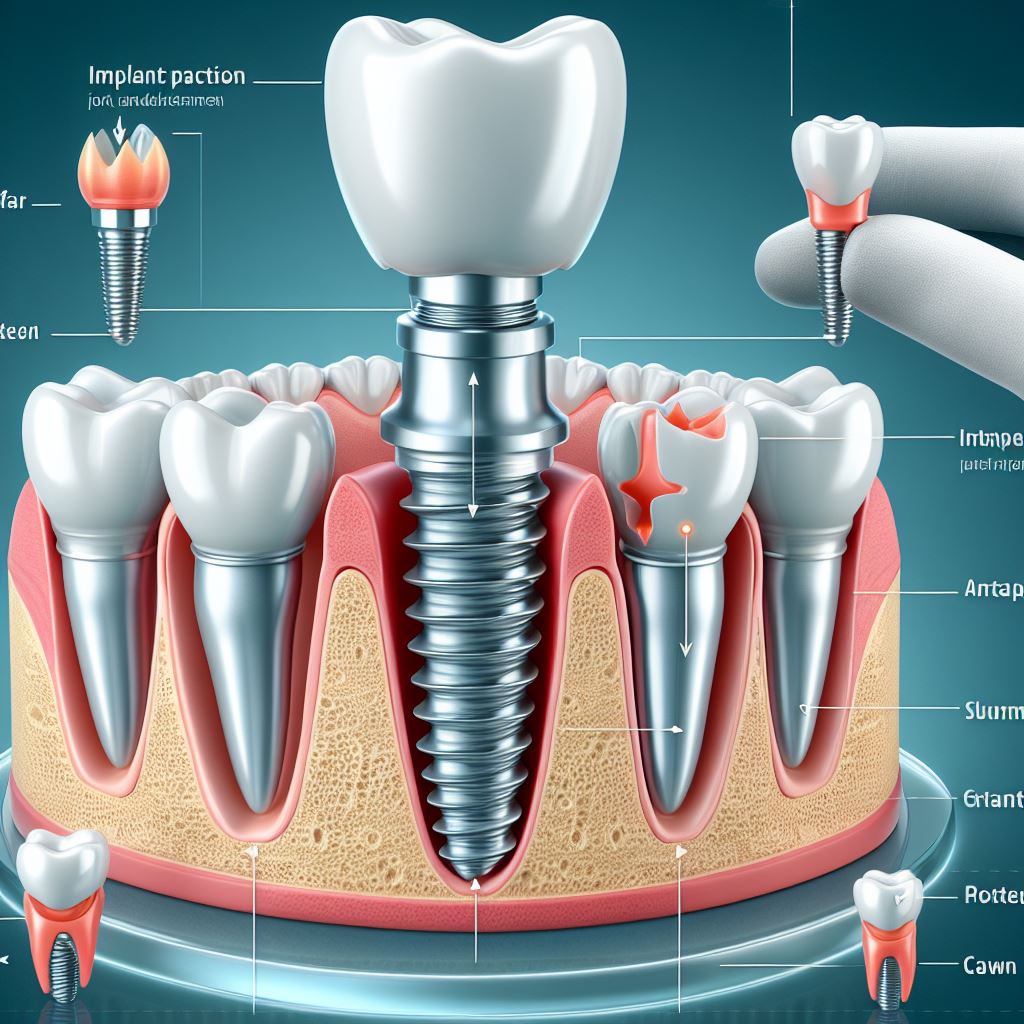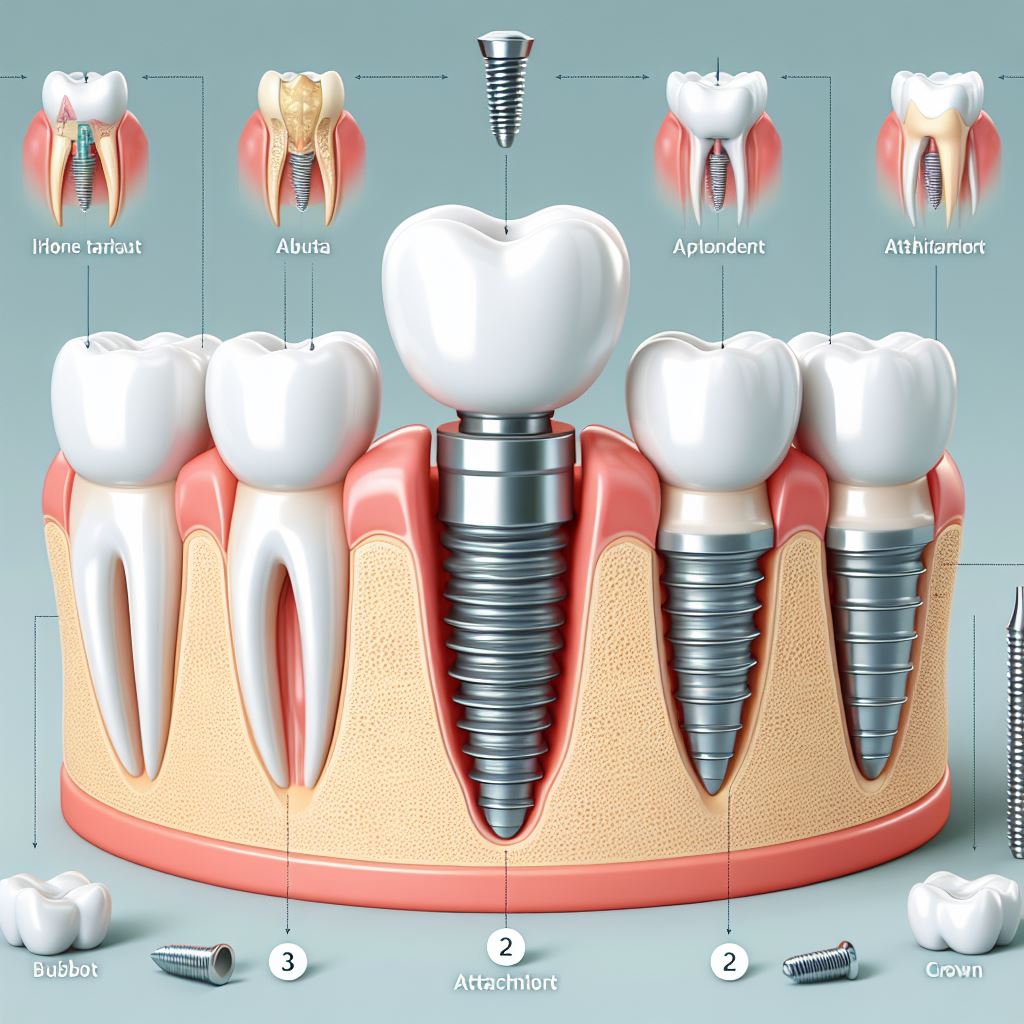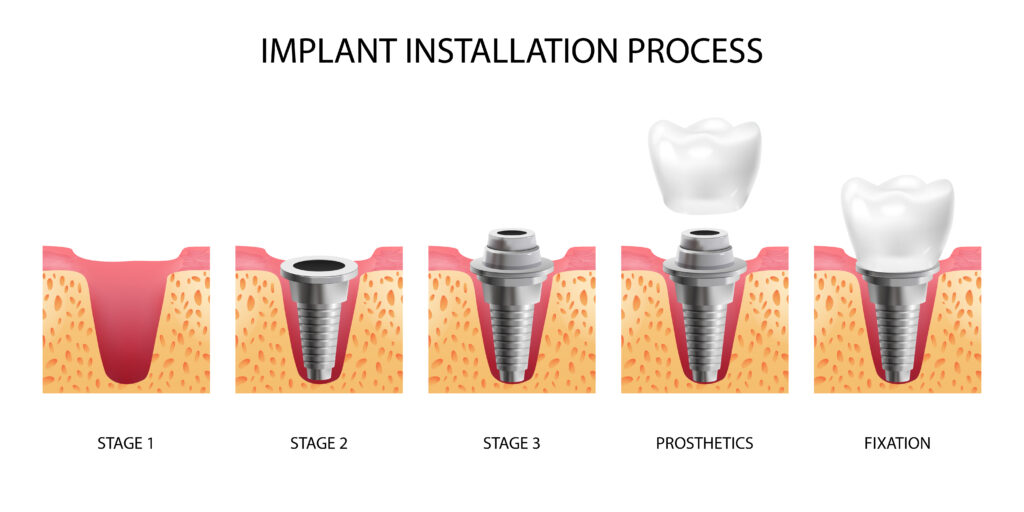Dental implants work by inserting titanium posts into the jawbone, which serve as artificial tooth roots that can support replacement teeth. Dental implants provide a long-lasting and natural-looking solution for missing teeth, improving overall oral health and functionality.
The surgical procedure involves careful evaluation and planning, followed by the placement of the implant into the jawbone. Over time, the implant fuses with the jawbone through a process called osseointegration, creating a strong foundation for the replacement tooth or bridge.
Dental implants offer numerous benefits, including improved speech, comfort, and restoration of a confident smile. With proper care and maintenance, dental implants can last a lifetime, making them a popular and effective solution for replacing missing teeth.

What Are Implants For Teeth?
Dental implants are artificial tooth roots that function like natural teeth. They are surgically placed into the jawbone and provide a strong foundation for replacement teeth or bridges. The implants fuse with the bone over time, ensuring stability and durability.
When it comes to addressing missing teeth, dental implants have become the go-to solution. These artificial tooth roots are designed to provide a strong foundation for replacement teeth that look, feel, and function like natural ones. Implants for teeth offer numerous advantages over other dental restoration options, making them a popular choice among patients.
Plain Paragraph: Implants For Teeth Explained
Dental implants are essentially titanium posts that are surgically placed into the jawbone beneath the gums. These posts act as artificial roots for the replacement teeth. Once the titanium posts fuse to the jawbone, they provide a stable base onto which custom-made dental crowns or bridges can be securely attached.
Implants for teeth offer a long-lasting solution that mimics the strength and functionality of natural teeth.
Bullet Points: Benefits Of Dental Implants
- Improved appearance: Dental implants blend seamlessly with natural teeth, providing a natural and aesthetically pleasing smile.
- Enhanced comfort: Unlike removable dentures, implants for teeth eliminate the discomfort and inconvenience of ill-fitting prosthetics.
- Enhanced speech: Implants ensure optimal speech clarity, as they do not slip or click like traditional dentures.
- Improved chewing and eating: With dental implants, you can enjoy your favorite foods without worrying about discomfort or restricted dietary choices.
- Long-term durability: Implants for teeth are a permanent solution that, with proper care, can last a lifetime.
- Preservation of facial structure: By stimulating the jawbone, dental implants help prevent bone loss and maintain your facial structure.
- Convenient oral hygiene: Dental implants can be cared for just like natural teeth with regular brushing, flossing, and dental check-ups.
Plain Paragraph: A Game-changer For Oral Health
Implants for teeth have revolutionized the field of dentistry, offering a permanent solution for replacing missing teeth. With their natural appearance, comfort, and functionality, dental implants have significantly improved the quality of life for those seeking to restore their smiles.
Whether you’re missing a single tooth or multiple teeth, dental implants can provide a reliable and long-lasting solution that will leave you confidently showing off your smile.
Remember, choosing dental implants involves a thorough evaluation by a dental professional to determine if you’re a suitable candidate. Consult with your dentist to learn more about the benefits and the specific dental implant procedure best suited for your needs.

How Does The Process Of Getting Dental Implants Work?
Tooth loss may be remedied by dental implants. The process involves surgically placing a titanium post into the jawbone, which serves as the foundation for attaching a custom-made artificial tooth or crown. This allows for a natural-looking and functional replacement tooth that can last a lifetime.
One common way to replace lost teeth is with dental implants. This permanent dental restoration procedure offers a natural-looking and functional replacement for those who have lost one or more teeth. But how does the process of getting dental implants work? Let’s explore the steps involved in this transformative treatment.
Initial Consultation:
- Schedule an appointment with a qualified dentist who specializes in dental implants.
- Give a detailed account of your dental care, including any procedures you may have had done in the past.
- The dentist will conduct a thorough examination of your teeth, gums, and jawbone.
- X-rays or 3D scans may be taken to assess the condition of your jawbone and determine if it’s suitable for implant placement.
Treatment Planning:
- Based on the examination and scans, the dentist will create a personalized treatment plan tailored to your specific needs.
- The treatment plan will outline the number of implants required and the placement strategy.
- The dentist will discuss the entire process, including potential risks and complications.
Implant Placement:
- At your next appointment, the dentist will administer local anesthesia to ensure your comfort throughout the procedure.
- In order to access the jawbone, the dentist will create a tiny cut in the gums.
- A specialized drill is used to create a small pilot hole in the bone.
- The dental implant, a titanium screw-like post, is then carefully inserted into the pilot hole.
- The gum tissue is sutured back in place, leaving the implant fully covered.
Osseointegration:
- Over the next few months, the process of osseointegration takes place, during which the implant fuses with the jawbone.
- This integration is vital for the stability and longevity of the implant.
Placement Of Abutment:
- Once osseointegration is complete, another minor surgery is performed to attach an abutment to the implant.
- The abutment acts as a connecting element between the implant and the final restoration.
Restorative Phase:
- Impressions of your teeth are taken to create an accurate mold for the final dental crown or bridge.
- The dental lab fabricates the custom restoration based on these impressions.
- Once the final restoration is ready, it is securely attached to the abutment, completing the dental implant process.
Dental implants provide a long-lasting solution that can improve your oral health, restore your smile, and enhance your overall quality of life. If you’re considering dental implants, consult with an experienced dental professional who can guide you through every step of the process.
Say goodbye to missing teeth and hello to a confident new you with dental implants.
What Takes Place When You Lose A Tooth?
Losing a tooth can lead to various dental issues, but dental implants provide a reliable solution. These implants work by surgically placing a titanium post into the jawbone, which acts as a replacement tooth root and allows for the attachment of a crown, ensuring a natural-looking and functional replacement tooth.
When a tooth is lost, it not only affects the appearance of your smile but also has implications for your oral health and overall well-being. Understanding what happens when you lose a tooth can help you appreciate the benefits of dental implants, a popular treatment option for replacing missing teeth.
In this section, we will delve into the process and effects of tooth loss, shedding light on the importance of dental implants in restoring both function and aesthetics.
Bone Loss And Shifting Teeth:
- Over time, the absence of a tooth can lead to bone loss in the jaw area.
- This occurs because the stimulation provided by the tooth’s roots during chewing is no longer present.
- As a result, the bone begins to resorb, leading to a decrease in its density and volume.
- Additionally, adjacent teeth may start to shift and tilt toward the gap left by the missing tooth.
Impact On Chewing And Digestion:
- Missing teeth can make it difficult to chew properly, affecting your ability to break down food effectively.
- This can lead to digestive issues, as insufficiently processed food may not be properly absorbed by the body.
- Furthermore, difficulties in chewing can limit your food choices, preventing you from enjoying a varied and nutritious diet.
Facial Appearance And Self-confidence:
- Losing a tooth can cause a visible change in facial structure, particularly in the surrounding jawbone area.
- The loss of bone volume can create a sunken or aged appearance, affecting the contours of your face.
- This alteration in facial aesthetics can impact your self-confidence and overall emotional well-being.
Speech Impairments:
- Teeth play a crucial role in speech production, helping to shape sounds and aid in pronunciation.
- The absence of a tooth can lead to speech impairments, such as lisps or difficulties with specific sounds.
- Restoring missing teeth with dental implants can help overcome these speech challenges.
Overall Oral Health:
- When a tooth is lost, the neighboring teeth may become more susceptible to decay, gum disease, and misalignment.
- Spaces left by missing teeth can trap food particles and bacteria, increasing the risk of oral health problems.
- By replacing a lost tooth with a dental implant, you can maintain proper oral hygiene and prevent these potential issues.
Understanding the consequences of losing a tooth highlights the importance of seeking appropriate treatment. Dental implants offer a long-lasting solution to tooth loss, addressing both functional and aesthetic needs. In the following sections, we will explore the mechanics of dental implants and their exceptional benefits in greater detail.

Why Might I Need An Implant For My Tooth?
Dental implants are needed when a tooth is missing or damaged beyond repair. The implant, a titanium post, is surgically placed in the jawbone and serves as a sturdy anchor for a replacement tooth, providing a natural and long-lasting solution.
Dental implants are a popular and effective solution for individuals who have lost a tooth or teeth due to various reasons. Whether it’s from tooth decay, gum disease, injury, or any other dental issue, implants can help restore your smile and improve your overall oral health.
Here are some reasons why you might need a dental implant:
- Missing Teeth: Dental implants are the ideal option if you are missing one or more teeth. They provide a permanent and natural-looking solution that blends seamlessly with your existing teeth.
- Enhanced Functionality: When you have a missing tooth, it can affect your ability to bite, chew, and speak properly. Dental implants restore the functionality of your mouth, allowing you to enjoy all your favorite foods without any discomfort or embarrassment.
- Preservation of Bone Structure: When a tooth is lost, the underlying jawbone can begin to deteriorate over time. Dental implants provide the necessary stimulation to the jawbone, preventing bone loss and preserving its structure.
- Improved Appearance: A missing tooth can significantly impact your appearance and self-confidence. Dental implants not only fill the gap but also enhance your overall facial aesthetics, giving you a natural and youthful smile.
- Longevity: Dental implants are a long-term solution. They have the potential to last forever with the right amount of TLC. Unlike other dental restorations that may require replacements or adjustments over time, implants offer a durable and reliable option.
- Adjacent Teeth Protection: Traditional tooth-supported bridges require the alteration of the adjacent teeth to support the restoration. Dental implants eliminate the need for this, ensuring the integrity and health of your neighboring teeth remain intact.
Dental implants provide numerous advantages, making them an excellent choice for individuals seeking a permanent tooth replacement solution. They offer a natural-looking, functional, and long-lasting option that can greatly enhance your oral health and overall well-being.
What Happens During The Process Of Getting A Dental Implant?
During the dental implant process, a titanium post is surgically placed into the jawbone to serve as the artificial tooth root. The surrounding bone fuses with the post, creating a stable foundation for the replacement tooth.
The use of dental implants to restore lost teeth has recently gained popularity. But have you ever wondered what exactly happens during the process of getting a dental implant? Let’s dive into the details and understand how dental implants work:
Placing The Implant:
- The first step in getting a dental implant is a thorough examination and consultation with your dentist. If they think you have excellent dental health, they will give you the go-ahead to have the surgery done.
- Once it is decided that you are a suitable candidate, your dentist will use a local anesthetic to numb the area where the implant will be placed.
- The dentist will then make an incision in your gum to expose the bone. They will carefully drill a small hole in the bone, creating a space for the implant.
- The dental implant, which is usually made of titanium, is then placed into the drilled hole. This implant serves as an artificial root for your new tooth.
Osseointegration:
- After the implant is placed, a process called osseointegration takes place. This is when the bone in your jaw fuses with the surface of the implant, creating a strong and stable foundation.
- Osseointegration typically takes several months, during which you will be given a temporary tooth replacement (such as a denture or a bridge) to wear. This allows you to maintain normal oral function while the implant integrates with the bone.
Attaching The Abutment:
- Once the implant has fully integrated with the bone, the next step is to attach the abutment. The abutment is a small connector piece that protrudes from the implant and serves as a link between the implant and the artificial tooth.
- To attach the abutment, your dentist will make a small incision in your gum to expose the implant. They will then carefully place and tighten the abutment onto the implant.
Placing The Artificial Tooth:
- Finally, it’s time for the placement of the artificial tooth, also known as the dental crown. The crown is custom-made to match the size, shape, and color of your natural teeth, ensuring a seamless integration with your smile.
- Your dentist will take impressions of your teeth and send them to a dental laboratory, where the crown will be fabricated. Once the crown is ready, your dentist will securely attach it to the abutment, completing the dental implant process.
Dental implants offer not only functional benefits but also aesthetic advantages by restoring your smile and boosting your confidence. Through the step-by-step process of placing the implant, achieving osseointegration, attaching the abutment, and placing the artificial tooth, dental implants work to provide a long-lasting and natural-looking solution for replacing missing teeth.
What Should I Do After Getting An Implant?
After getting a dental implant, it is important to follow your dentist’s instructions for post-operative care. This may include maintaining good oral hygiene, avoiding certain foods, and attending follow-up appointments to ensure proper healing and success of the implant.
After the dental implant procedure, it is essential to take proper care of your new implant to ensure its longevity and maintain your oral health. Here are the steps you should follow after getting a dental implant:
Avoid Disturbing The Implant Area
- Refrain from touching, prodding, or disturbing the implant area with your fingers or tongue. This helps prevent any damage or irritation to the area, ensuring proper healing.
- Avoid chewing on hard or sticky foods that can potentially dislodge the implant or cause complications.
Maintain Good Oral Hygiene
- Brush your teeth thoroughly but gently twice a day using a soft-bristled toothbrush. This helps keep your implant and surrounding teeth free from plaque and debris.
- Use a mild, non-alcoholic mouthwash to rinse your mouth after brushing to further reduce the risk of infection.
Follow Post-operative Instructions
- Particular post-operative instructions will be given to you by your dentist. It is crucial to follow them diligently to promote healing and prevent complications.
- Attend all follow-up appointments as scheduled to allow your dentist to monitor the healing process and address any concerns promptly.
Be Mindful Of Your Diet
- Stick to a soft or liquid diet for the first few days after the implant procedure. This allows the implant site to heal without excessive pressure or strain.
- Slowly introduce solid foods as directed by your dentist, gradually increasing the texture and difficulty of the foods you consume.
Avoid Smoking And Excessive Alcohol Consumption
- Tobacco use and heavy alcohol use can slow recovery and raise the likelihood of problems. It is best to refrain from these habits during the initial recovery period.
Protect Your Implant During Physical Activities
- If you participate in sports or activities that may put your implant at risk, wear a protective mouthguard or take necessary precautions to prevent any potential damage to the implant area.
Address Any Concerns Promptly
- If you experience persistent pain, swelling, bleeding, or any other unusual symptoms following the implant procedure, contact your dentist immediately. Prompt intervention can help prevent further complications.
By following these guidelines and maintaining good oral hygiene practices, you can ensure the success of your dental implant and enjoy a functional and natural-looking tooth replacement for years to come. Remember, proper care and regular check-ups are key to maintaining your oral health and preserving your beautiful smile.

How Should I Take Care Of My New Tooth?
Caring for a newly placed dental implant involves gentle brushing, flossing, and regular dental check-ups to ensure its longevity and prevent any complications. Maintaining good oral hygiene and following your dentist’s instructions will help you enjoy your new tooth for years to come.
- Brush and floss regularly: Just like your natural teeth, it’s crucial to brush your dental implant twice a day with a soft-bristle toothbrush and fluoride toothpaste. Don’t forget to floss daily to remove any plaque or food particles that may accumulate around the implant.
- Use an antimicrobial mouthwash: Rinse your mouth with an antimicrobial mouthwash after brushing to further reduce the risk of infection and maintain healthy gums. Consult your dentist for the most suitable mouthwash for you.
- Be gentle: While brushing, use gentle strokes and avoid applying excessive pressure on the implant area. Vigorous brushing or using a hard-bristle toothbrush can irritate the gums and potentially damage the implant.
- Avoid smoking: Smoking can have a negative impact on your oral health, including the success of your dental implant. Tobacco use increases the risk of implant failure, so it’s best to quit smoking to promote healing and overall oral health.
- Maintain regular dental visits: Schedule regular dental check-ups and professional cleanings with your dentist. These visits will allow your dentist to monitor your implant’s success and identify any potential issues early on.
- Be mindful of your diet: Avoid chewing on hard foods, ice, or other objects that could potentially damage your dental implant. Opt for a balanced diet rich in fruits, vegetables, and lean proteins to promote overall oral health.
- Protect your implant during physical activities: If you participate in sports or activities that expose your mouth to potential injury, consider wearing a mouthguard. This precaution will help protect your implant and surrounding teeth from any trauma.
- Address any concerns promptly: If you experience any discomfort, pain, or notice any changes or complications around your dental implant, contact your dentist immediately. Early intervention can prevent further complications and ensure successful healing.
Remember, following these guidelines will contribute to a long-lasting dental implant and a healthy smile. Don’t hesitate to consult your dentist if you have any questions or concerns regarding your new tooth.
What Are The Pros And Cons Of Getting A Dental Implant?
Dental implants offer several advantages, such as improved appearance, speech, and comfort. However, they also come with drawbacks, including cost, time-consuming procedure, and potential complications. Nonetheless, dental implants are an effective and reliable solution for replacing missing teeth.
Pros And Cons Of Getting A Dental Implant
Dental implants are a popular choice for people who have lost a tooth or teeth and want a long-lasting solution that looks and functions like natural teeth. Like any dental procedure, there are pros and cons to consider before deciding if a dental implant is the right option for you.
In this section, we will explore the advantages and disadvantages of getting a dental implant.
Pros:
- Improved aesthetics: Dental implants are designed to blend seamlessly with your natural teeth, providing a natural and attractive smile.
- Enhanced chewing ability: Unlike dentures, dental implants allow you to eat your favorite foods without worrying about discomfort or slippage.
- Long-lasting solution: Dental implants are an affordable and long-lasting solution because, with the right care and upkeep, they may last a lifetime.
- Preserves jawbone health: When a tooth is lost, the underlying jawbone can deteriorate over time. Dental implants help stimulate bone growth, preventing bone loss and maintaining facial structure.
- Adjacent teeth preservation: Unlike bridges, dental implants do not require adjacent teeth to be altered or compromised, ensuring the integrity of the surrounding teeth.
Cons:
- Time-consuming process: The dental implant process involves multiple stages, including healing periods, which can span several months. Immediate results may not be achievable.
- Surgical procedure: Dental implant placement requires oral surgery, which carries inherent risks such as infection, nerve damage, or sinus problems. However, these complications are rare.
- Cost: Dental implants tend to be more expensive compared to other tooth replacement options. Insurance coverage may vary, thus affecting the accessibility.
- Not suitable for everyone: Certain medical conditions, such as uncontrolled diabetes or active gum disease, may limit the eligibility for dental implants.
It is essential to consult with a qualified dentist or oral surgeon to assess your specific dental needs and determine if a dental implant is the right choice for you. While there are some drawbacks to consider, the benefits of dental implants often outweigh the drawbacks, resulting in a beautiful, functional, and confident smile that can last a lifetime.
What Can I Do Instead Of Getting A Dental Implant?
Looking for alternatives to dental implants? Explore options such as bridges or dentures that can replace missing teeth effectively. Consider consulting with a dental professional to discover the best solution for your specific needs.
If you’re considering alternatives to dental implants, here are some options to explore:
- Dentures: Dentures are removable prosthetic devices that can replace missing teeth. They are an affordable and non-invasive solution for tooth replacement. Dentures come in two types: full dentures, which replace all the teeth in the upper or lower jaw, and partial dentures, which are used when only a few teeth are missing.
- Dental Bridges: A dental bridge is a fixed prosthetic device that bridges the gap between missing teeth. It consists of a false tooth (pontic) held in place by crowns attached to the adjacent teeth. Dental bridges are a good alternative for patients who don’t want surgery or have insufficient bone for dental implants.
- Resin-Bonded Bridges: Also known as Maryland bridges, resin-bonded bridges are a conservative option for tooth replacement. They are typically used for replacing a single missing tooth with minimal tooth preparation. Resin-bonded bridges are less invasive and cost-effective compared to implants but might not be as durable.
- Removable Partial Dentures: If you have multiple missing teeth but still have some remaining healthy teeth, removable partial dentures can be an option. These dentures have clasps that attach to the remaining teeth, providing support and stability.
- Orthodontic Treatment: In some cases, orthodontic treatment can help manage the space created by missing teeth. By moving the surrounding teeth closer together or creating space for a prosthetic tooth, orthodontics can help improve the appearance and function of your smile.
- Conservative Options: If you only have minor cosmetic concerns, dental bonding or veneers can be used to enhance the appearance of your teeth. These minimally invasive treatments can improve the shape, color, and alignment of teeth without the need for surgery or implants.
- Maintain Good Oral Hygiene: While not a replacement for missing teeth, maintaining good oral hygiene is crucial for preserving the health of your remaining teeth and supporting oral function. Brushing twice a day, flossing daily, and visiting your dentist regularly can help prevent further tooth loss and decay.
Remember, each individual’s dental needs are unique, and it’s important to consult with your dentist to determine the most suitable treatment option for your specific situation.
How Much Do Implants For Teeth Cost?
Dental implant costs can vary significantly depending on factors like location and the number of implants needed. On average, a single implant can cost between $1,500 to $6,000, making it essential to consult a dentist for an accurate estimate.
Dental implants are a popular solution for replacing missing teeth and restoring natural functionality and aesthetics. If you’re considering getting dental implants, one of the key factors you might be curious about is the cost. In this section, we’ll explore the different aspects that influence the cost of dental implants and give you a better understanding of what to expect financially.
Factors That Influence The Cost Of Dental Implants:
- Number of Implants: The cost of dental implants will vary depending on how many teeth need to be replaced. Each implant requires its own surgical procedure, which will affect the overall cost.
- Implant Material: The type of material used for the implants can affect the cost. The biocompatibility and long lifespan of titanium make them a popular implant material.
- Additional Procedures: In some cases, additional procedures might be necessary before the implant placement, such as bone grafting or sinus lift. These procedures can increase the overall cost.
- Location: The geographical location of the dental practice can also influence the cost. Prices may differ from one region to another, so it’s essential to consider this factor.
- Complexity of the Case: Dental implants can vary in complexity. Factors such as the condition of the surrounding teeth and gums, the need for extractions, or the presence of infections can impact the overall cost.
- Dentist’s Experience: The experience and expertise of the dentist performing the implant surgery can also impact the cost. Experts in their field could demand a premium for their services.
The Range Of Dental Implant Costs:
- Single Tooth Implant: On average, the cost of a single dental implant can range from $3,000 to $4,500. This includes the implant’s post, the abutment, and the crown.
- Multiple Teeth Implants: If you need several teeth replaced, the cost will increase accordingly. The range for multiple implants can start from $6,000 and can go up to $50,000, depending on the number of teeth and complexity.
- Full Mouth Reconstruction: For those seeking a full mouth reconstruction with implants, the cost can range from $20,000 to $50,000 or even higher. This comprehensive procedure involves replacing all teeth with implant-supported dentures or bridges.
How To Afford Dental Implants:
- Insurance Coverage: Some dental insurance plans offer coverage for dental implants. Review your policy to determine if any part of the procedure is covered.
- Dental Financing: Many dental practices offer financing options to help make dental implant treatment more accessible. This allows patients to pay for their implants in installments.
- Health Savings Accounts (HSAs) or Flexible Spending Accounts (FSAs): Check if you have an HSA or FSA that can be used for dental implant expenses. These accounts allow you to use pre-tax money for medical and dental costs.
- Payment Plans: Discuss payment plans with your dentist. They may offer options to spread out the cost over a defined period.
Understanding the factors that influence the cost of dental implants and exploring financing options can help you plan and make an informed decision. Remember, dental implants are a long-term investment in your oral health and quality of life.

Resources and Support
You can learn more about periodontal treatment here.
You can find out more about how to care for your teeth at Teeth.org.au
Sources:
Australian Dental Association (Dental Implants), Australian Dental Prosthetists Association (Dental implants), Australian and New Zealand Academy of Periodontists (ANZAP) (Are You a Candidate for Dental Implants?), Australian and New Zealand Academy of Periodontists (ANZAP) (What Dental Implants Can Do?), Australian Government Dept Veterans Affairs (Dental implants)
Learn more here about the development and quality assurance of healthdirect content.
How Dental Implants Heal And Care Afterward
Dental implants function by fusing with the jawbone, providing a strong foundation for replacement teeth. After the procedure, proper care involves practicing good oral hygiene and regular check-ups to ensure proper healing and long-term success.
When one or more teeth are lost, dental implants are a great way to restore full mouth function. But how exactly do dental implants work, and what happens during the healing process? In this section, we’ll explore the fascinating journey of dental implants and the essential care required afterward.
Dental implants go through a remarkable process of healing and integration with the surrounding tissues. Here’s what you need to know:
- Osseointegration: Implants are made of biocompatible materials, such as titanium, which have the unique ability to fuse with the jawbone. This process, called osseointegration, allows the implant to become a strong and stable foundation for the replacement tooth. During the healing period, which typically takes a few months, osseointegration occurs gradually.
- Good Oral Hygiene: After the implant surgery, it’s crucial to maintain proper oral hygiene to ensure the longevity of your dental implant. Regular brushing and flossing will help keep the implant clean and prevent any potential complications. Your dentist will guide you on the best oral care practices following the procedure.
- Dietary Considerations: While healing, it’s essential to be mindful of your diet to support the recovery process. Stick to soft foods and avoid hard or crunchy items that could potentially put pressure on the implant site. Your dental professional will provide specific dietary recommendations based on your unique situation.
- Follow-up Appointments: Regular visits to your dental provider are crucial for monitoring the healing progress and overall health of your implant. Your dentist will check the implant site, make any necessary adjustments, and ensure that everything is going smoothly. These follow-up appointments are essential for long-term success.
- Lifestyle Factors: Certain lifestyle habits, such as smoking and excessive alcohol consumption, can have a negative impact on the healing process of dental implants. It’s highly recommended to refrain from smoking and limit alcohol intake during the healing period to optimize the chances of a successful outcome.
The journey of dental implants involves a complex healing process known as osseointegration, requiring proper care and attention. By maintaining good oral hygiene, following dietary recommendations, attending follow-up appointments, and adopting a healthy lifestyle, you can enhance the healing process and enjoy the long-term benefits of your dental implant.
Always consult with your dental professional for personalized guidance throughout your implant journey.

Credit: hoffmankarldmd.com
Frequently Asked Questions Of How Do Dental Implants Work
How Do Dental Implants Work?
Titanium dental implants are surgically implanted into the jawbone to serve as replacement roots for missing teeth. They provide a strong foundation for fixed or removable replacement teeth and act as natural tooth roots. Once the implants are in place, the crowns or dentures are attached, restoring the appearance and functionality of natural teeth.
Are Dental Implants Painful?
The dental implant procedure is typically performed under local anesthesia, ensuring that the patient does not feel any pain during the surgery. Some discomfort may be experienced after the procedure, but this can be managed with over-the-counter pain medications prescribed by your dentist.
How Long Do Dental Implants Last?
Dental implants have a long lifespan when taken care of correctly. Regular dental check-ups and maintaining good oral hygiene are essential for the long-term success of dental implants. Following your dentist’s instructions on oral care, brushing, flossing, and avoiding habits such as smoking can help prolong the lifespan of your dental implants.
Can Anyone Get Dental Implants?
Most people who are in good overall health and have healthy gums are suitable candidates for dental implants. However, certain conditions such as uncontrolled diabetes, heavy smoking, and certain medications can affect the success of dental implant procedures. Your dentist will evaluate your oral health and medical history to determine if dental implants are the right option for you.
Conclusion
Restoring lost teeth with dental implants is a safe and effective option. By securely anchoring artificial teeth into the jawbone, they offer a long-lasting, natural-looking, and functional replacement option. With their ability to maintain oral health and restore self-confidence, dental implants have become a popular choice for individuals seeking a permanent solution to tooth loss.
Don’t hesitate to consult with a dental professional to determine if dental implants are the right choice for you.

I am a dentist and also blog regularly. my target audience is America Europe & providing regular information for them.
